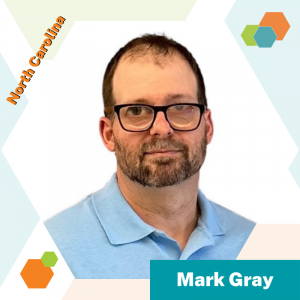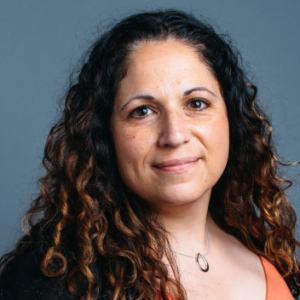In September 2024, Advance CTE and ECMC Foundation announced the third cohort of The Postsecondary State Career Technical Education Leaders Fellowship at Advance CTE—Sponsored by ECMC Foundation (Fellowship). The Advance CTE — ECMCF Fellows include representation across multiple demographic categories reflecting the Fellowship’s goal of intentionally building a postsecondary leadership pipeline for underserved populations in Career Technical Education (CTE) that closes racial representation gaps and removes equity barriers to postsecondary leadership advancement.
 This blog is part of the Fellow Feature series, highlighting the journeys and insights of leaders in the Fellowship. In this blog, Advance CTE interviewed Fellow Mark Gray, director of safety and security at North Carolina Department of Commerce, and adjunct instructor at Dunwoody College of Technology.
This blog is part of the Fellow Feature series, highlighting the journeys and insights of leaders in the Fellowship. In this blog, Advance CTE interviewed Fellow Mark Gray, director of safety and security at North Carolina Department of Commerce, and adjunct instructor at Dunwoody College of Technology.
Q: How did your background shape your path into this field?
A: I’ve always been around construction, whether it was demolition or building. I also had the privilege of working in retail, including store remodels. These experiences gave me a strong foundation in hands-on work and an appreciation for safety and efficiency. Recognizing an opportunity to merge my practical experience with a more knowledge-based approach, I pursued a master of science in occupational health and safety at East Carolina University. This path allowed me to focus on improving workplace safety while applying my expertise. I began teaching in 2022, encouraged by mentors who saw it as a way to broaden my experience with both students and industry professionals. Teaching has been an invaluable avenue for bridging my field expertise with education.
Q: There’s often a divide between “white-collar” professions and jobs in the skilled trades, especially when it comes to the guidance learners receive from school counselors. How do you address this misconception in CTE?
A: Coming from the field, I can speak authentically about my experiences and show how they’ve shaped my career. I emphasize the value of skilled trades and their critical role in the economy while also highlighting pathways to leadership and decisionmaking roles. When working with students, I meet them where they are, avoiding assumptions about what they may already know. I approach each learner as an individual, using plain, relatable language and making it clear that we’re all on a journey of learning and growth.
Q: You’ve been vocal about the need to explore equity and soft skill development in distance learning modalities. Why do you think this is such a crucial issue?
A: With the rise of online education, students are increasingly pursuing learning opportunities that lack face-to-face interaction. While this flexibility is beneficial, it often limits opportunities to develop soft skills like effective communication, teamwork, and problem-solving. These skills are essential for success in any industry. It’s vital that we intentionally integrate soft skill development into distance learning environments to ensure that students are fully prepared for the workforce, regardless of the modality of their education.
Q: You’ve spoken before about your commitment to advancing education and improving organizational practices. Can you share how this commitment has shaped your leadership and actions in your current role?
A: I take a holistic approach to leadership, recognizing that every individual has a unique story. Listening is one of the most important skills a leader can have. By truly hearing others, I aim to amplify their voices in the decisions I make. Whether I’m working with students, educators, or industry partners, I prioritize building connections and fostering collaboration to achieve meaningful, lasting change.
Q: What do you see as the future of CTE in North Carolina and what challenges do you think need to be addressed?
A: North Carolina has an exciting future in CTE, especially as emerging industries create new opportunities. For example, the offshore wind industry represents a significant area for growth, and we need to ensure the workforce is prepared for the jobs it will bring. Similarly, advancements in artificial intelligence (AI) will require students to become familiar with tools like Prompt Engineering to stay competitive in the labor market. The challenge lies in maintaining close communication with industry leaders to identify evolving needs and adapting our programs accordingly.
Q: You’re clearly passionate about creating long-term change. What advice would you give to others who want to make a difference in CTE or workforce development?
A: There are talkers and there are doers. Real progress comes from action. If you have an idea but don’t act on it, it remains just a dream. To make a difference, you have to take that first step. I strive to be a doer and encourage others to follow suit. Action leads to impact, and impact creates lasting change.
Q: As a participant in Advance CTE’s National Fellowship, what do you hope to gain from this experience?
A: I hope to grow both personally and professionally. I don’t know everything, and I value the opportunity to learn from others and step into challenging uncomfortable spaces. Growth often comes from discomfort, and I find that exciting. This fellowship offers a unique chance to expand my perspective and gain insights that will help me make a greater impact in CTE.
As Mark’s journey to leadership in CTE demonstrates, our Fellows are passionate about providing high-quality opportunities to learners while considering their unique experiences and being responsive to their needs. His insights are just one example of the incredible work being done by the fellows of the Advance CTE National Fellowship. To learn more about Mark and other inspiring leadership fellows, visit the Postsecondary State CTE Leaders Fellowship page, where you can discover how these doers are shaping the future of CTE across the nation.

